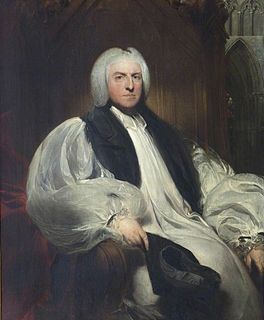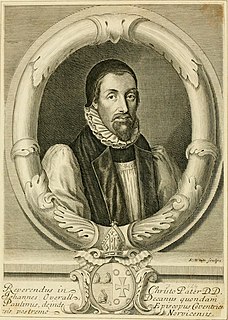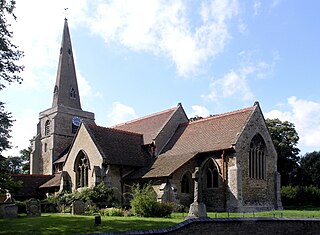Related Research Articles

Lancelot Andrewes was an English bishop and scholar, who held high positions in the Church of England during the reigns of Elizabeth I and James I. During the latter's reign, Andrewes served successively as Bishop of Chichester, of Ely, and of Winchester and oversaw the translation of the King James Version of the Bible. In the Church of England he is commemorated on 25 September with a Lesser Festival.

Shute Barrington was an English churchman, Bishop of Llandaff in Wales, as well as Bishop of Salisbury and Bishop of Durham in England.

Thomas Burgess was an English author, philosopher, Bishop of St David's and Bishop of Salisbury.

Benjamin Hoadly was an English clergyman, who was successively Bishop of Bangor, of Hereford, of Salisbury, and finally of Winchester. He is best known as the initiator of the Bangorian Controversy.

Peter Mews was an English Royalist theologian and bishop.

Temple Chevallier FRAS was a British clergyman, astronomer, and mathematician. Between 1847 and 1849, he made important observations regarding sunspots. Chevallier has been called "a remarkable Victorian polymath". Not only did he write many papers on astronomy and physics, he also published a translation of the Apostolic Fathers that went into a second edition, and translated the works of Clement of Alexandria, Polycarp and Ignatius of Antioch.

John Overall (1559–1619) was the 38th bishop of the see of Norwich from 1618 until his death one year later. He had previously served as Bishop of Coventry and Lichfield, as Dean of St Paul's Cathedral from 1601, as Master of Catharine Hall from 1598, and as Regius Professor of Divinity at Cambridge University from 1596. He also served on the Court of High Commission and as a Translator of the King James Version of the Bible.

John Egerton was a Church of England clergyman from the Egerton family who eventually rose to be Bishop of Durham. As a young man he was associated with the beginning of tourism down the River Wye and later with the controversial appointment of an English monoglot to a Welsh-speaking parish in Anglesey.

John Howson was an English academic and bishop.

Edward Maltby was an English clergyman of the Church of England. He became Bishop of Durham, controversial for his liberal politics, for his slightly naive ecumenism, and for the great personal wealth that he amassed.

Brian Duppa was an English bishop, chaplain to the royal family, Royalist and adviser to Charles I of England.

James Montague was an English bishop.

Brownlow North was a bishop of the Church of England.

Fugglestone St Peter was a small village, manor, and civil parish in Wiltshire, England, lying between the town of Wilton and the city of Salisbury. The civil parish came to an end in 1894 when it was divided between the adjoining parishes, and today Fugglestone is a largely residential area in the north of Wilton parish; however, the 13th-century parish church survives.
The Archdeacon of Exeter is a senior ecclesiastical officer of the Diocese of Exeter in the Church of England. The modern diocese is divided into four archdeaconries: the archdeacon of Exeter supervises clergy and buildings within the area of the Archdeaconry of Exeter.

St James' Church, Stretham, is an active Anglican church in the village of Stretham, Cambridgeshire, England. Founded in the 12th century, it was heavily restored by the architect J. P. St Aubyn in 1876. English Heritage, a body responsible for preserving historical sites in the United Kingdom, assessed the church a Grade II* listed building. The turret clock on the east face of the tower was also made in 1876, by JB Joyce & Co of Whitchurch, Shropshire, and still keeps good time. The church has a ring of six bells hung for change ringing. Regular ringing resumed at the church in June 2011 after several years' silence. St James' is one of eight churches in the Ely Team Ministry.
Henry Bland was an English cleric.
Arthur Burns is professor of modern British history and from 2014 to 2017 was Vice-Dean (Education) in the Faculty of Arts and Humanities at King's College London. In 2017 he was appointed academic director of the Georgian Papers Programme at King's. Burns specialises in the history of English religion since the mid-eighteenth century, and particularly the history of the Church of England. Burns co-founded and co-edits the Boydell and Brewer monograph series Studies in Modern British Religious History. He received his undergraduate degree and doctorate from Balliol College, Oxford. He is a fellow of the Royal Historical Society, and from 2012-16 was its Vice President (Education), overseeing policy on the teaching of History in both schools and universities; he previously served as one of its Literary Directors. In 2016 he was appointed President of the Church of England Record Society, and was awarded an honorary fellowship of the Historical Association in 2015.
The Ven. Henry Egerton (1729–1795) was Archdeacon of Derby from 1769 until his death.
William Nicholas Darnell (1776–1865) was an English cleric, academic and antiquarian.
References
- 1 2 "About". CCEd: Clergy of the Church of England Database Project. King's College London. Retrieved 6 October 2017.
- ↑ "Professor Arthur Burns". Department of History. King's College London. Retrieved 6 October 2017.
- ↑ "Professor Kenneth Fincham". School of History. University of Kent. Retrieved 6 October 2017.
- ↑ "Professor Stephen Taylor". Department of History. Durham University. Retrieved 6 October 2017.